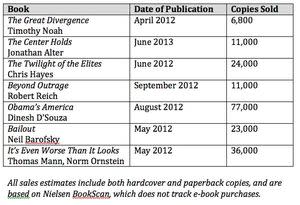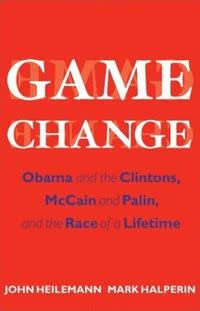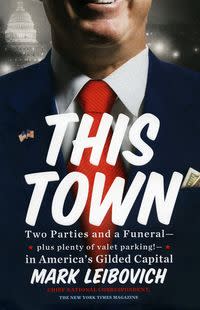Can 'This Town' Close the Deal?
Expectations are unabashedly high for Mark Liebovich’s just-published This Town, the snarky new book about Washington by the respected New York Times reporter. Reviews have praised the book effusively; Liebovich has been given cover placement in the Times Magazine – where he works; This Town has been called “brilliant” and “very funny,” with one review urging, “Don’t miss this book.”
RELATED: Spitzer Was Too Busy with Current TV to Vote in the 2012 Election
But while book reviewers and Washington-watchers have had plenty of fun with the book — with The Washington Post going so far as to publish an unauthorized index to the book, as it does not contain one — the question now is whether all that publicity can translate into sales, if the enthusiasm of the media and political worlds for our This Town can infect readers in Oklahoma and Maine.
RELATED: The Senate Deal Doesn’t Help Obama on Judges, and That’s What Matters Most
“We expect it to spur a national discussion and be widely read,” publicist Eliza Rosenberry of Blue Rider Press – the Penguin imprint that published This Town on Tuesday – told The Atlantic Wire. She said the first printing of the book runs to 84,000 copies, which Sarah Weinman, the news editor of Publishers Marketplace, called “very respectable.” You can be sure Blue Rider is hoping never to see these books on the discount rack at Barnes & Noble. Weinman estimates that Blue Rider paid Liebovich an advance of around $500,000 (he had previously been slated to publish with Simon & Schuster in what Publishers Marketplace called in 2010 “a major deal”). Blue Rider (which declined to comment on the advance it paid to Liebovich) intends to make that back – and then some.
RELATED: How to Think About: Moderation
The ultimate question for Penguin is whether This Town, which is currently #24 on Amazon's list of best-sellers, can be a game-changer. Or, rather, if it can be Game Change. The latter, recall, is the 2010 book by Mark Halperin and John Heilemann about the 2008 presidential election, focusing in particular on Barack Obama’s defeat of Hillary Clinton in the Democratic primary, the infidelities of John Edwards and the selection of Sarah Palin as John McCain’s running mate on the Republican ticket.
RELATED: What's So Terrible About an Anthony Weiner Comeback, Anyway?
In many ways, Game Change is the high-water mark of political journalism of the last decade. It sold an impressive 422,000 copies in hardcover alone, according to Nielsen BookScan, which tracks print book sales across the nation. Moreover, it was turned into an HBO film starring Ed Harris and Julianne Moore. A pretty good book became an excellent franchise – with a sequel on the way.
RELATED: The Cast of HBO's 'Game Change' So Far
This Town shares many of the qualities that made Game Change a success beyond the Beltway. Neither book treats Washington with the reverence it could once expect from the press corps – yet both Liebovich and Halperin/Heilemann write with the cool knowingness of insiders, never too outraged or upset, careful not to compromise past or future sources. Most crucially, both books avoid the inside baseball and wonkiness that infect too many tomes about Washington. They almost read like movie scripts. In a good way, that is.
Liebovich himself is acutely aware of where Game Change stands in the political-book lexicon, calling it “the picture of mass-market success in a category – political books – that never produces smashes outside of [Bob] Woodward.” The opening of the film version of the book is “the marquee event of the late winter [of 2012],” according to Liebovich, who is surely hoping for a similar outcome for his own book (not without good reason).
Intending to capture as wide an audience as possible, Liebovich steers wide of wonkiness. Some reviews knocked him for it, claiming that the book is light on serious analysis. In The Wall Street Journal, for example, Andrew Ferguson wrote that the book was suffused in “triviality.”
But you can’t blame Liebovich for wanting to traffic in gossip – and rather juicy gossip, while we’re at it – about Valerie Jarrett instead of analyzing Obamacare’s tortuous path through Congress.
That’s because no matter how smart and incisive, wonkery has fared poorly as of late. Timothy Noah’s The Great Divergence, based on a popular series of articles on Slate about economic equality, has sold only about 7,000 copies since its 2012 publication, according to Nielsen BookScan, which covers about 85 percent of the print market but does not include e-books. Jonathan Alter’s The Center Holds, about the 2012 presidential contest, is a more sober book than This Town; its sales figures, 11,000 copies, have been good but not impressive. Meanwhile, the photogenic MSNBC host Chris Hayes has sold about 22,000 copies of Twilight of the Elites, which in effect lambastes much the same culture that is Liebovich’s target, if from a different perspective. Thomas Mann and Norman Ornstein’s It’s Even Worse Than It Looks, about congressional dysfunction, was the recipient of highly complimentary coverage and has sold a respectable 36,000 copies – a figure that would represent a disappointment for This Town.
Then again, the question – for Liebovich, for Halperin and Heilemann, whose Double Down is coming this fall – is how much more Washington Americans can stand. Popular disapproval of Congress is at 77 percent, a reflection of how tired most people are of all things Capitol Hill. Yes, This Town is above the fray with its intelligence and humor, but will that be enough for readers who have no more tolerance for Washington’s political humidity?
Or, as The Washington Post’s Carlos Lozada wondered in his review,
It’s all quite fun but, beyond Washington, will many people care? I suspect most Americans can make it through their days without knowing what Tammy Haddad is up to…But [This Town is] not trying to be a book for the ages — it’s a book for the moment, and it captures it well.
It’s a question whose stakes are high. The answer will come soon enough.
Photo by Zach Frailey via Flickr.




